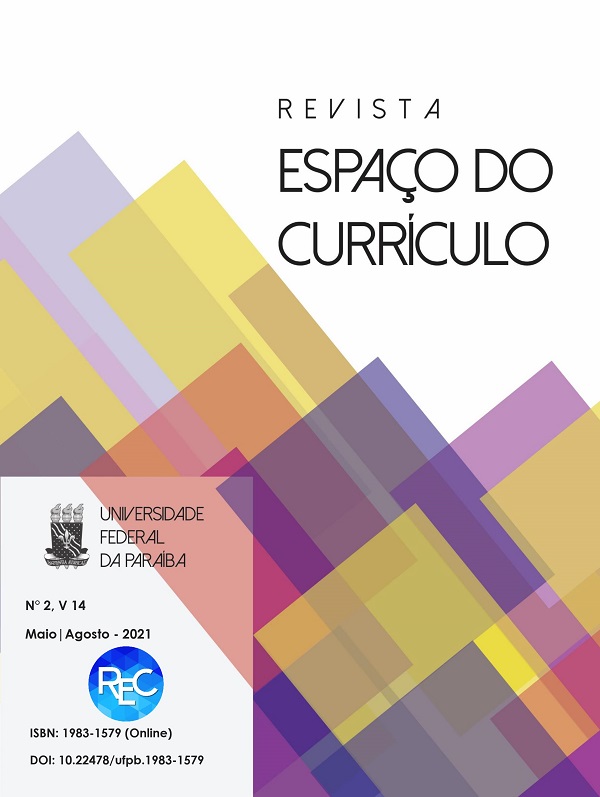CURRICULUM AND SOCIAL MOBILITY IN ANGOLA
bridges and voids in the relationship
DOI:
https://doi.org/10.22478/ufpb.1983-1579.2021v14n2.50325Keywords:
Curriculum, Study plans, Education, Context, Social mobilityAbstract
Education, wich pumps the blood of development, is a fundamental right of the human being, and in addition to collaborating for its progressive change, is determinant for the growth of the country. To this end, a relevant and current educational system is required, which takes a deep reading of the social and economic context, in order to facilitate citizen´s social mobility. In this sense, the present text aims to contribute with some critical reflections on the face and social mobility of young people attending general courses in Angola. To support it, and drawing on the qualitative approach, we privilege the bibliographic collection, reading and interpretation of the normative documents related to the theme. The results show that curricula and study plans for general courses in Angola do not yet establish a health interface with the social context, which would allow for the development of full citizens, who would experience a health insertion and social ascension. The lack of this recommended interface contributes to the increase of the frustration levels of the young generation after the conclusion of the average training cycle. The text suggest that, in the current context, education should be a priority for socio-economic development, focusing essentially on the needs of the social and economic context, contributing to the vertical social mobility of individuals.
Downloads
Metrics
References
ANGOLA (2010). Assembleia Nacional - Constituição da República. I Série-n.º 23, de 5 de Fevereiro.
ANGOLA (2016). Decreto-Lei n.º 17/16, de 7 de Outubro – publicado no Boletim Oficial da República. I Série – n.º 170 – Cria os principios e as bases gerais do Sistema de Educação e Ensino.
BORDIEU, Pierre. A miséria do mundo. Tradução Mateus Soares et. al. 2ª ed. Petrópolis: Vozes, 1997.
CASTEL, Robert. "As metamorfoses da questão social: uma crónica do salário. Petrópolis: Vozes, 1998.
GERMANI, Gino. Estratégia para estimular a mobilidade social. In: La industrialización en América Latina. Joseph A. Kahl ed. México, Fondo de Cultura Económica, 1961. P. 274-6.
JULIÃO, António. A Autonomia Curricular do Professor em Angola: Limites, Desafios e Possibilidades. Revista Contemporânea de Educação, Brasil, v. 14, n. 29, pp. 309-328, jan/abr., 2019
INSTITUTO NACIONAL de Investigação e Desenvolvimento da Educação (INIDE) 2013. Currículo do 2º Ciclo do Ensino Secundário Geral. Angola: Luanda. 3ª Edição. Editora Moderna, S.A.
MINISTÉRIO DA EDUCAÇÃO. Caracterização Global do Contexto Angolano e Respectivo Sistema Educativo. Reforma Curricular/INIDE. Luanda: Ministério da Educação, 2003.
PACHECO, José. Currículo: teoria e práxis. Porto: Porto Editora, 2001.
YOUNG, Michael. Para que servem as escolas? Educ. Soc., Campinas, vol. 28, n. 101, p. 1287-1302, set./dez. 2007. Disponível em: <http://www.scielo.br/scielo.php?pid=S0101-73302007000400002&script=sci_abstract&tlng=pt>. Acesso em: 12 jul. 2019, 17:46.
ROLDÃO, Maria. Os Professores e a Gestão do Currículo. Porto: Porto Editora, 1999.
SOARES, Magda. Letramento: um tema em três géneros. Belo Horizonte: Ed. Autêntica, 2005.
Downloads
Published
How to Cite
Issue
Section
License
Copyright (c) 2021 Curriculum Space Journal

This work is licensed under a Creative Commons Attribution 4.0 International License.
By submitting an article to Curriculum Space Journal (CSJ) and having it approved, the authors agree to assign, without remuneration, the following rights to Curriculum Space Journal: first publication rights and permission for CSJ to redistribute this article. article and its metadata to the indexing and reference services that its editors deem appropriate.
















